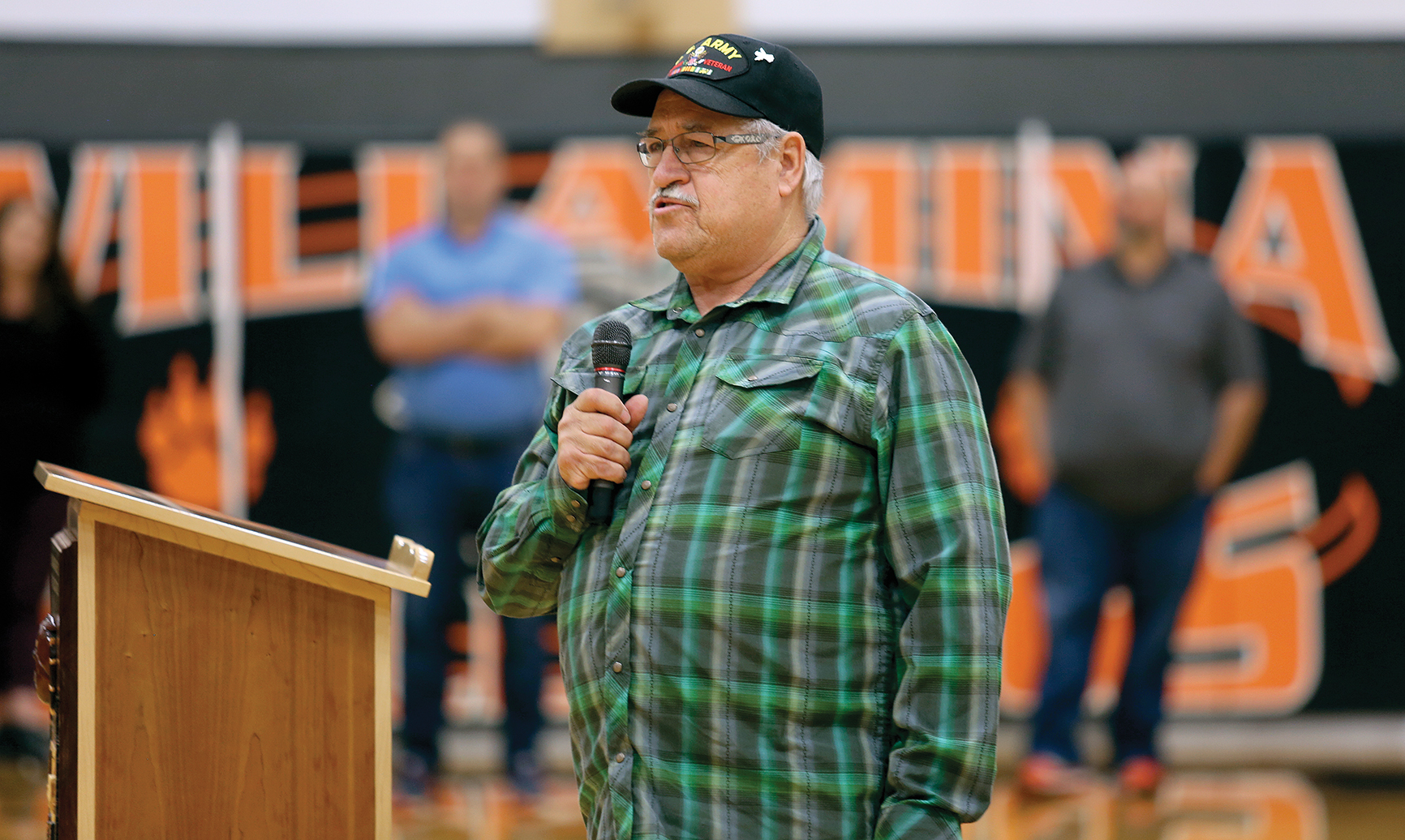Culture
Tribal veterans address Willamina students

By Danielle Frost
WILLAMINA -- Steve Bobb Sr. has served in many capacities in his lifetime, but his service as a Marine in Vietnam is at the top of the list.
“I have seen mankind at its best and at its worst,” Bobb said. “I have seen courage beyond imagination … and am still haunted by the memories of what I heard, saw and smelled. Even with all of this, to have stood in the ranks of those who served fills me with overwhelming pride.”
The Grand Ronde Tribal Elder, former Tribal Council member and Veterans Special Event Board chairman joined other local Vietnam veterans who spoke about their experiences during a Thursday, Nov. 9, assembly at Willamina High School.
Also in attendance were past Tribal Council Chair Reyn Leno, Tribal Elder Raymond Petite, Grand Ronde Color Guard member Rich VanAtta and members of the Willamina Veterans of Foreign Wars chapter.
Bobb joined the Marines in 1968, at the height of the Vietnam War. He said during that time it was expected that he serve his country in some capacity.
“I come from a strong military background,” he said.
Bobb’s grandfather served in World War I, his uncle was killed during the D-Day invasion of World War II and his two older brothers served in the Air Force during the Korean conflict.
“I believe my uncle’s death haunted my grandfather until the day he died,” he said.
Bobb told the students that veterans take an oath to defend America from all threats, both foreign and domestic.
“These people took their orders to defend our peace and democracy, that most often is taken for granted,” Bobb said. “But Arlington National Cemetery and the tens of thousands of white crosses that cover the landscape are a testimony to lives cut short so we could live free. These were young people who never got to have full lives.”
He described Marine Corps boot camp as “everything I had heard about and more.”
“Seven of us from Grand Ronde joined because we thought of ourselves as bad asses,” he said. “Boy, what a mistake that was!”
Bobb said that the veterans who volunteered to speak to the students would likely have restless nights, dreaming about what happened decades ago.
“This is not a video game,” he said. “This is real life. Forty-eight years later, I still wake up in a lurch to make sure I am home.”
Fellow Vietnam veteran and Marine Reyn Leno described the war zone as “an ugly place.”
“(There are) not a lot of good things that came out of there, and we live with it every day,” he said. “Veterans give you guys a right to go to bed and get up every day. The pay in Vietnam was about $100 a month, and I saw people die for it.”
Leno said that when Vietnam veterans returned home, they were often spit on due to the political climate in America at the time.
“The war wasn’t our fault,” he said. “That is the problem with war. The politicians don’t go, we do.”
Leno told students about how he once saved a pack of turkey noodles from a C-ration for two months to eat on Thanksgiving.
“When we look at the American flag, we see blood, sweat and tears,” he said. “When people look at that flag and they don’t understand, they are the ones who will go down on one knee (referring to the NFL protests). But veterans are the ones who gave them the right to do that. So if you see a veteran, just give them a simple thanks.”
Petite served for 20 years in the Army. He was first drafted in 1967. Soon after, his mother was diagnosed with breast cancer.
“I could have stayed here, but I didn’t hesitate to go,” he said. “I knew she was safe here. What I saw over there, most people can’t and don’t want to imagine.”
During his time in the military, Petite served two tours of duty in Vietnam, and was stationed in Alaska, Germany and Fort Lewis, Wash.
Petite’s father served in World War II, and his youngest son and granddaughter are both veterans.
“Being a veteran is a big honor,” he said. “I was called in and did my job to the best of my ability.”
